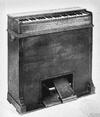- harmonium
-
/hahr moh"nee euhm/, n.an organlike keyboard instrument with small metal reeds and a pair of bellows operated by the player's feet.
* * *
or reed organFree-reed keyboard instrument in which wind from a foot-operated bellows causes metal reeds to vibrate.Pitch is determined by the size of the reed; there are no pipes. Separate sets of reed produce different tone colours, the sound quality being determined by the size and shape of the tone chamber surrounding each reed. The harmonium developed in the early to mid-19th century in Europe and America, and it was a very popular church and home instrument into the 1930s. Harmonium by Jacob Alexandre, Paris, 19th centuryBehr Photography
Harmonium by Jacob Alexandre, Paris, 19th centuryBehr Photography* * *
free-reed keyboard instrument that produces sound when wind sent by foot-operated bellows through a pressure-equalizing air reservoir causes metal reeds screwed over slots in metal frames to vibrate through the frames with close tolerance. There are no pipes; pitch is determined by the size of the reed. Separate sets of reeds provide different tone colours, the quality of the sound being determined by the characteristic size and shape of the tone chamber surrounding each reed of a given set; constricted chambers, for instance, induce powerful vibration and incisive tone. Volume is controlled by a knee-operated air valve or directly from the bellows pedals by an expression stop that allows the wind supply to bypass the reservoir. The instrument's compass is normally four to five octaves.The earliest instrument of the harmonium group was the physharmonica, invented in 1818 by Anton Haeckl in Vienna. His invention was inspired by the Chinese mouth organ, or sheng, which, taken to Russia in the 1770s, had introduced the free reed to Europe and aroused the interest of certain physicists and musicians. Now extinct, other types (such as John Green's seraphine) appeared before Alexandre Debain produced his harmonium in Paris in 1840. The main improvements after 1850 were made by Victor Mustel in Paris and Jacob Estey in the United States.The harmonium was a popular church and household instrument until the electronic organ drove it from the market after the 1930s. Compositions for the instrument include numerous works by the French composers César Franck and Louis Vierne and a quartet for two violins, cello, and harmonium by the Bohemian composer Antonín Dvořák.* * *
Universalium. 2010.
